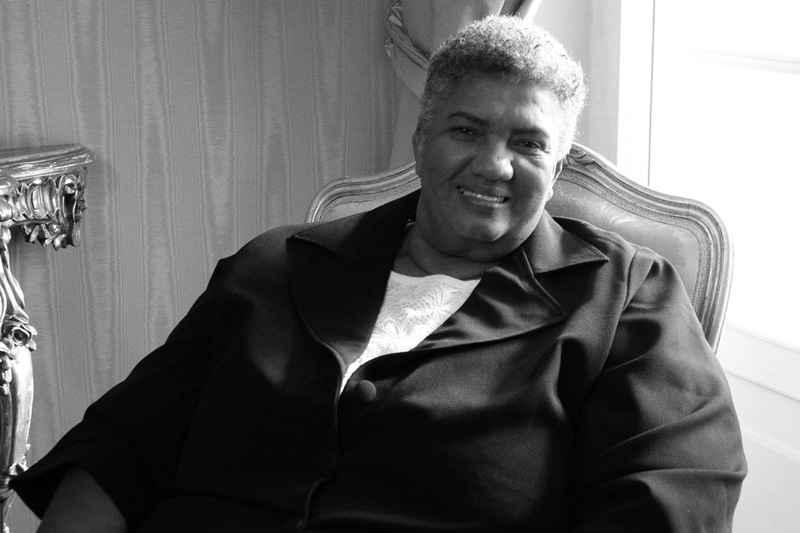Truth Commission Snapshot 15
Angela Salazar’s legacy: Recognising the Complex History of the Diverse Black Colombia
Walking with the victims, you learn to listen. This phrase was one of the most distinctive phrases Angela Salazar used to say. Until her death, she was the only Black woman truth commissioner, and before that, was a women’s rights defender. Born in Chocó, Colombia, Salazar lived most of her life in Apartadó, Antioquia, where she began her career as an advocate of Black people’s and women’s rights. Salazar died in the first week of August from COVID-19. During her work as a truth commissioner, she understood that the history of Black people (including Raizal and Palenque ethnic communities) was a priority for the Truth Commission (TC). On various opportunities, Salazar asserted that Colombian national history neglects the critical input of Black people’s culture and history in its narrative. The TC would be a tool to depart from these silences surrounding Colombian Black history. This Snapshot shows Angela Salazar’s legacy within the Commission, reflecting on how the TC is dealing with Black history in the context of the internal armed conflict.
The ‘Ethnic People’s Direction’
The TC, along with Salazar, has understood from the very beginning of its mandate that working with Black communities and other ethnic groups would require differential treatment. The Commission formed the ‘Ethnic People’s Direction’ to lead every aspect of the relationship between the TC and ethnic communities in Colombia. The Direction’s responsibilities include providing ethno-sensitive research methodology guidelines; and coordinating the relationship between the Commission’s local offices (Truth Houses), outside of Bogotá, and ethnic communities. Another critical responsibility has been arranging consultations with ethnic groups to negotiate access, enabling researchers to gather collective statements about victimisation or human rights’ violations responsibilities.
The Ethnic People’s Direction reported it had achieved two of its goals by December 2019. First, they presented a research model that was sensitive to the experience of ethnic communities. This model fed into multiple pedagogic processes involving hundreds of participants from different organisations across the country, honouring a collaborative mechanism that includes ethnic communities in all the phases of the research process. Second, the Direction conducted five national encounters between the permanent working groups within the TC and ethnic communities. These meetings were a mechanism to harmonise the expectations of ethnic communities with the actions of the Commission.
Through the Ethnic People’s Direction, the Commission has ultimately demonstrated its commitment to creating appropriate tools to deal with historically misrepresented and excluded ethnic groups.
Working with Black Communities
The TC’s collaborative work on clarification with all of the Colombian Black communities has had three phases. The first phase took place from the second half of 2018 to the first half of 2019. This was a phase of inquiry and methodological design guided by one principle: to make visible the voices of the different Black communities in Colombia. Commissioners Patricia Tobón Yagari and Angela Salazar played a critical role in this phase, meeting with hundreds of social organisations in the Pacific and Caribbean regions.
The second phase of the Commission’s collaborative work with the various Colombian Black communities took place during the first half of 2019. Frameworks for listening and collaboration were put in place during those months. In terms of listening, three Truth Houses (provincial offices looking to allow a better communication between the commission and its collaborators) were opened in Quibdo, Tumaco, and Buenaventura. These cities are historically home to higher proportions of Black communities than any other Colombian cities. In terms of collaboration, the “Permanent Working Group” between the Truth Commission and authorities from Planque, Raizal, Black, and Afro Colombian peoples was established. A technical working group was also created to analyse the relationship between racism and the logic of the internal armed conflict. According to this group, there is a traceable link between the violence that Black people suffered during the colonial period and the violence that Black communities suffer today.
The third phase of the Commission’s work with the diversity of Colombian Black communities has been in operation from 2019 to the present. It is better described as the practice of a collaborative action-research initiative. The action-driven part of the research highlights the urgent necessity of working against the current forms of violence aimed at social leaders that represent the multiple Black communities. Aside from their work in demanding direct action from the state to protect Black communities, the Commission has been successful in gathering the results of the previous phases’ work. It has received testimonies, partnered with cultural initiatives, and also received collective memory reports from particular communities.
Embrace Dialogue praises the commitment shown by the Truth Commission and the different Black communities working with it to provide a better and more comprehensive depiction of Colombia’s troubled past. We commemorate Angela Salazar’s critical input to truth and peacebuilding, setting an example for Colombian society to fight against every form of racism.



